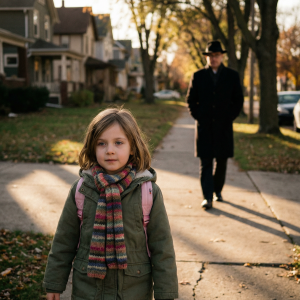The moment Tyler’s hands connected with my back, I knew everything had changed. What started as our annual family gathering by Willow Creek had just become something darker — my own grandson shoving me off the pier while his parents watched from lawn chairs, cocktails in hand.
I’m seventy-four years old. I haven’t been swimming since before my knee replacement three years ago. The doctor specifically warned against any water activities that might strain my joints. But there I was, plunging into the murky lake while my family erupted in laughter above.
“Sink or swim, Nana!” Tyler called out, his twenty-year-old voice dripping with cruel amusement. “Time to see what you’re made of!”
The cold water hit me like a slap. My arthritic fingers clawed desperately at the surface as I struggled to stay afloat. Through the chaos, I caught glimpses of the pier — my son Marcus shaking his head with what looked like embarrassment, not concern. His wife Jennifer recording everything on her phone, probably planning to share it on social media with some caption about “crazy family moments.”
Nobody moved to help. Not one of them.
I managed to grab onto the pier’s edge, my lungs burning as I hauled myself back onto solid ground. Water streamed from my soaked cardigan, my good shoes squelched with every step, and still — silence. They’d already moved on, diving back into discussions about vacation rentals and weekend plans.
“Drama queen,” I heard Jennifer mutter to her friend Sarah, loud enough to be intentional. “She’s always looking for attention.”
That night, dripping wet in my guest bathroom, I stared at my reflection. Wild gray hair plastered to my scalp, angry red scratches on my palms from the rough dock, mascara streaked down my cheeks. I looked like exactly what I was — a foolish old woman who’d let her family walk all over her for years.
But something else stared back at me from that mirror. Something that had been dormant too long. Something that was done being pushed around.
How did we get here? I used to be Tyler’s hero. When Marcus went through his divorce and couldn’t handle single parenting, Tyler lived with me for two full years. I drove him to soccer practice, helped with algebra homework, celebrated every small victory. I’d dipped into my retirement savings to pay for his summer camps and school supplies.
The same boy who once made me Mother’s Day cards now treated me like an obstacle to his inheritance.
I sat in my kitchen that night, still damp and trembling, and made a decision. They wanted to see me as weak and irrelevant? Fine. I’d give them exactly what they expected while I figured out my next move.
My neighbor Ruth showed up the next morning with her usual timing — bearing fresh scones and an uncanny ability to sense drama.
“You look terrible,” she announced, setting down her basket and studying my face. “What happened?”
I told her everything. Ruth listened with the intensity of a prosecutor taking notes, occasionally muttering phrases like “unbelievable” and “those ungrateful brats.”
When I finished, she pulled out her phone. “I’ve been waiting for this day,” she said, scrolling through her contacts. “My nephew is a family lawyer. Patrick specializes in cases where people need to protect themselves from their own relatives.”
“I’m not sure I’m ready for that,” I hesitated.
“Honey,” Ruth said, fixing me with her no-nonsense stare, “they pushed you into a lake and laughed. Ready or not, it’s time.”
Patrick Chen had kind eyes behind wire-rimmed glasses and the sort of calm professionalism that immediately put me at ease. In his downtown office, surrounded by law books and family photos, I laid out the situation.
“Tell me about your financial arrangements with them,” he said, pulling out a legal pad.
I explained the college fund I’d established when Tyler was twelve — nearly sixty thousand dollars earning interest for his future. The monthly checks I’d been sending to help with Marcus and Jennifer’s mortgage. The “loans” that were never repaid for car repairs, medical bills, and their Bahamas cruise last spring.
“And after yesterday’s incident, how do you feel about continuing this financial support?” Patrick asked.
I thought about Tyler’s laughter echoing across the water. About Jennifer’s smirk. About Marcus’s complete indifference to my wellbeing.
“I think it’s time they learned to swim on their own,” I said.
But Patrick suggested something smarter than just cutting them off. “Let’s watch and see how they behave when they think you’re becoming more… vulnerable,” he suggested. “It might be illuminating.”
So I started the performance of my life.
I began moving slower around the house, pausing at the top of stairs as if catching my breath. I let my voice shake slightly when answering the phone. I started “forgetting” minor details in conversation, touching my forehead with theatrical confusion.
The response was swift and telling. Instead of concern, I saw calculation. Jennifer started asking pointed questions about my medications and doctor visits. Tyler rolled his eyes whenever I repeated myself. Marcus began having hushed conversations with his wife about “what happens when Nana can’t live alone anymore.”
I kept careful notes in a journal hidden in my bedroom. Every dismissive comment, every eye roll, every whispered conversation about my assets. They were building their case for taking control, and I was documenting every step.
The final straw came at Jennifer’s book club meeting. I’d volunteered to help serve refreshments, moving quietly between the kitchen and living room. I was refilling the coffee pot when I heard Tyler regaling the group with his version of the lake incident.
“So there’s Nana, flailing around like she’s drowning in three feet of water,” he laughed. “Total performance piece. She’s always been dramatic, but lately she’s really leaning into the helpless old lady act.”
“It’s honestly getting exhausting,” Jennifer chimed in. “We’re going to have to make some difficult decisions soon. She can’t keep living in that big house alone much longer.”
“The house would be perfect for us when we start having kids,” Tyler added. “Close to my job, great neighborhood. Really, we’d be doing her a favor by taking it off her hands.”
Doing me a favor. By taking my home.
That night, I called Patrick. “I’m ready to make some changes,” I told him.
The next morning, I transferred Tyler’s entire college fund to the local literacy foundation — a cause my late husband David had cared deeply about. Sixty-three thousand dollars, donated anonymously in David’s memory.
I also made some other adjustments. The monthly mortgage assistance to Marcus and Jennifer? Redirected to a scholarship fund for first-generation college students. The emergency credit card I’d given them for “family expenses”? Canceled.
Then I did something they’d never expect from their weak, helpless Nana. I bought a plane ticket to Portland, where my college roommate Eleanor had been begging me to visit for years.
I didn’t tell them I was leaving. Why should I? They barely acknowledged my presence anyway. I simply packed a suitcase, called a cab, and headed for the airport while they were at their respective jobs, probably planning their next family gathering around my dining room table.
My letter arrived three days later. Patrick hand-delivered it to ensure they received it personally.
“To my family,
Yesterday you discussed taking my house because I can no longer manage alone. Last week you laughed while I struggled in the lake. For months you’ve treated my love as a transaction and my generosity as an entitlement.
You wanted to see me helpless? Congratulations. You’ve successfully pushed away the person who sacrificed everything to support your dreams.
Tyler’s college fund has been donated to literacy programs. The mortgage assistance has been redirected to students who actually appreciate education. Consider this my final investment in your character development.
You taught me to swim on my own. Now it’s your turn.
— Eleanor Matthews”
The aftermath was swift and spectacular. Patrick fielded dozens of calls — from Marcus demanding to know if I was “mentally competent” to make such decisions, from Jennifer threatening legal action, from Tyler pleading for “just a conversation” to work things out.
But I was three thousand miles away, sitting on Eleanor’s back porch in Oregon, sipping coffee and watching hummingbirds dart between her flower boxes. For the first time in years, my phone stayed silent by choice.
Eleanor and I spent our days exploring Portland’s food scene, visiting art galleries, and catching up on decades of missed conversations. We took a pottery class together, joined a hiking group for seniors, and spent evenings playing Scrabble while rain drummed against the windows.
“You seem different,” Eleanor observed one evening. “Lighter somehow.”
“I am,” I realized. “I stopped treading water.”
Three months later, I found my own place — a cozy cottage in a retirement community twenty minutes from Eleanor. It has a small garden where I grow tomatoes and herbs, a reading nook with perfect afternoon light, and neighbors who invite me for coffee because they enjoy my company, not because they want something from me.
I volunteer at the local library now, helping with literacy programs funded partly by Tyler’s former college money. There’s a beautiful irony in that — his cruelty helping other young people achieve their dreams.
Sometimes I get letters forwarded from my old address. Apologies mixed with accusations, desperate attempts to restore their financial lifeline. I read them once, then file them away. My lawyer keeps copies, just in case.
Last week, Ruth called with an update from the old neighborhood. Marcus and Jennifer’s house went into foreclosure. Tyler dropped out of school and moved back in with them. Their social circle, built largely around the lifestyle my money had enabled, quietly faded away.
I felt something I didn’t expect: not satisfaction, but peace. They made their choices. I finally made mine.
This morning I sat by the community pond, watching the water lap gently against the shore. A family of ducks glided past, the mother leading her babies in a perfect line. The sun warmed my shoulders, and I thought about that terrible day by Willow Creek.
They pushed me into dark water, expecting me to sink. Instead, I learned to swim in clearer streams. I discovered that the only person who needed saving was myself — and I was perfectly capable of doing it.
Sometimes the bravest thing you can do is stop trying to rescue people who are determined to drown. Sometimes you have to save yourself first.
I’m still swimming. And the water is just fine.





